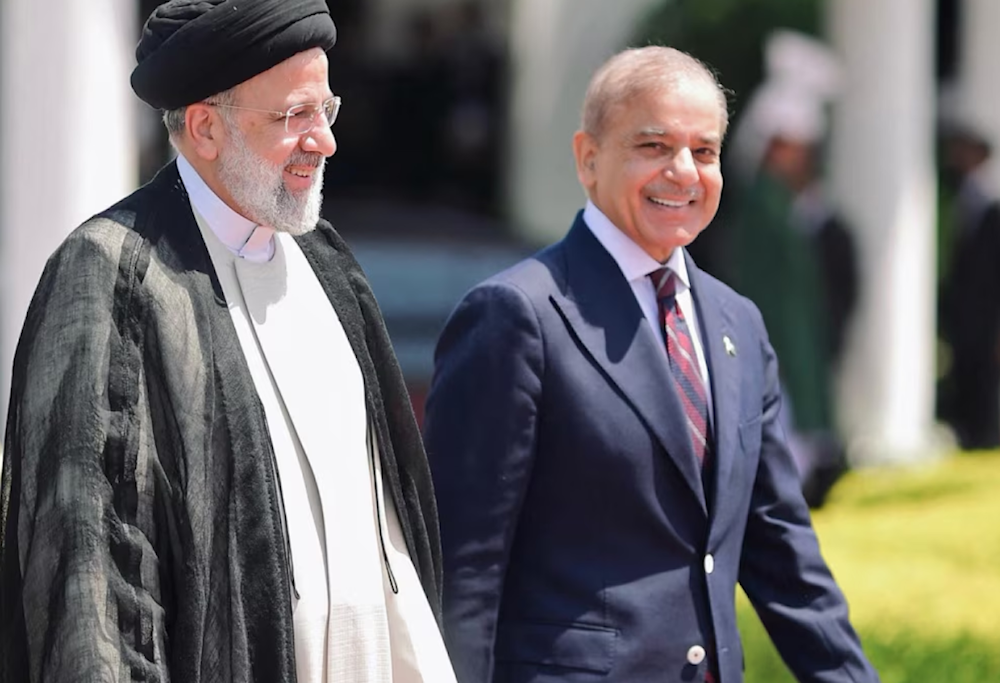Feeling defied, US waves sanctions card as Pakistan, Iran sign deals
The US has maintained a maximum pressure sanctions policy on Iran and its friendly allies as punishment for collaborating.
-

Iranian President Ebrahim Raisi walks with Pakistani Prime Minister Shehbaz Sharif to inspect a guard of honor in Islamabad on April 22, 2024 (AFP)
The United States has warned Pakistan of sanctions risks after the Islamabad administration struck security and commercial agreements with Iran during President Ebrahim Raisi's visit to the country.
US State Department Spokesman Vedant Patel told reporters Tuesday that although Pakistan can "speak to their own foreign policy pursuits," the US advises "anyone considering business deals with Iran to be aware of the potential risk of sanctions."
The US has maintained a maximum pressure sanctions policy on Iran and its friendly allies as punishment for collaborating.
Washington slapped restrictions last week on Pakistan's ballistic missile suppliers, including four from China and Belarus. Regarding the penalties, Patel stated that the US will continue to "disrupt" and take action against proliferation networks and weapons of mass destruction.
Pakistan has been attempting to restart a proposal to build a gas pipeline from Iran, which has been postponed for decades owing to the threat of US sanctions. When asked about the Pakistan-Iran pipeline during a congressional hearing last month, Assistant Secretary of State Donald Lu stated that the Biden administration will respect all Iran-related sanctions.
Meanwhile, Raisi stated at a news conference on Monday that Pakistan and Iran needed to increase bilateral trade to $10 billion within the next three to four years.
Shaista Tabassum, a professor at the University of Karachi, expressed that the US "will certainly not like" the two nations warming up.
Raisi held a joint press conference with Pakistani Prime Minister Shehbaz Sharif after arriving in Islamabad on Monday morning and meeting with Pakistani officials.
Raisi stressed once again that the two neighbors will enhance economic bilateral relations. After lauding the Pakistani government, Raisi said that relations will be enhanced with Pakistan "in all economic, political, and cultural fields."
The two countries also signed eight cooperation documents, memoranda of agreement, and notes, which were celebrated in a ceremony held in the presence of Raisi and the visiting delegation.
Iran, Pakistan condemn Israeli 'atrocities' in Gaza, demand ceasefire
Raisi and Sharif expressed their strong and "unequivocal condemnation" of the ongoing Israeli aggression on Gaza, which has crossed its 200-day mark, leaving over 34,000 Palestinian martyrs and more than 70,000 wounded.
In a joint statement during Raisi's trip to the neighboring country, both leaders denounced the Israeli occupation's "atrocities against the Palestinian people, along with the inhumane blockade of Gaza that has resulted in widespread death and destruction as well as displacement of millions of Palestinians."
They called for an immediate and unconditional ceasefire in the Strip, "unimpeded humanitarian access" to the besieged people of Gaza, the return of the displaced Palestinians, and "ensuring accountability for the crimes" being committed by the occupation.
The statement also reiterated both countries' support "for a just, comprehensive, and durable solution based on the aspirations of the people of Palestine."
In February, Iran launched strikes against a separatist group on Pakistani soil, stating that it would engage any party that undermines its national security. Relations between the neighbors saw limited tensions after Islamabad declared that the attack was a breach of its sovereignty. Shortly after, the same separatist group located on Iranian soil was targeted by Pakistan. Subsequently, the two countries agreed to coordinate and collaborate to end the mutual threat.

 3 Min Read
3 Min Read








